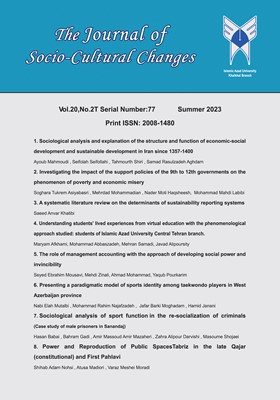Sociological analysis of the structure and function of socioeconomic development and sustainable development in Ardabil 1979-2021.
Subject Areas : Development
Ayyoub Mahmoudi
1
,
seyfollah seyfollahi
2
,
tahmures shiri
3
![]() ,
Samad Rasoulzadeh Aghdam
4
,
Samad Rasoulzadeh Aghdam
4
1 - PhD student in Sociology, Central Tehran Islamic Azad University, Tehran, Iran
2 - Associate Professor, Department of Sociology, Islamic Azad University, Department of Science and Research, Tehran, Iran
3 - Associate Professor, Department of Sociology, Islamic Azad University, Central Tehran Branch, Tehran, Iran
4 - Assistant Professor, Department of Sociology, Shahid Madani University of Azerbaijan, Tabriz, Iran
Keywords: Iran, Sustainable Development, Socio-Economic Development, Structure and Function of Development,
Abstract :
Sustainable development aims at meeting the current and future needs and achieving a balanced social, economic and bio-environmental status. In fact, it can be considered as the digital currency of the development. Contrary to the fact that social system in Iran contains the required potential for socio-economic development, there exists a one dimentional development reflected in the form of socio-economic anomie. Therefore, the main purpose of the present study is the sociological analysis of the structure and function of socio-economic and sustainable development in Iran from 1978 to 2021. Documentary method and content analysis were used in the study considering Seyfollahi’s approach including geographic-climatic, socio-living, tribal-demographic, cultural and political-managerial elements. Moreover, in the process of conducting the research, two variables of local development and particularism were included in study. The overall results of the study indicate that ignoring the development structures would be the main reasons for the current unsustainable development in Iran. Therefore, the detailed results revealed that: 1. Unsustainable development in Iran is the result of domestic, foreign and global circumstances. 2) Petrol budgeting has led to petrol-oriented reductionism in Iran. 3) Recently, there exists a shift away from petrol-oriented reductionism to political party-oriented reductionism. It is concluded that all of the above-cited factors have played a leading role in the appearance of more serious problems and social harms including poverty, drug addiction, prostitution, anomalous fashionable suicide, inflation, academic-degree orientation, lampoonism, indiscriminate use of natural resources and environmental destruction.
_||_


